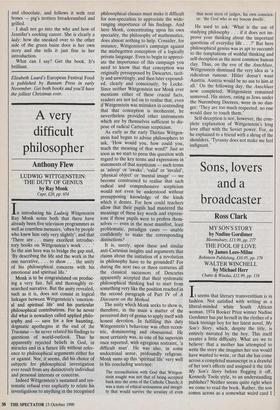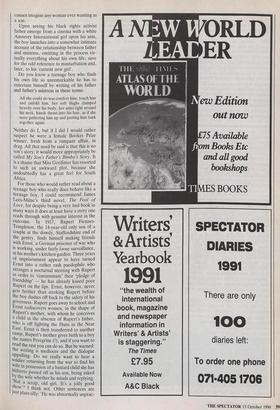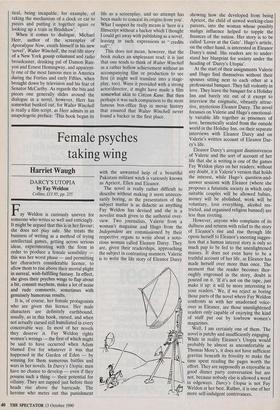Sons, lovers and a broadcaster
Ross Clark
MY SON'S STORY by Nadine Gordimer
Bloomsbury, £13.99, pp. 277
THE FOOL OF LOVE by James Lees-Milne
Robinson Publishing, £10.95, pp. 170
WALTER WINCHELL by Michael Herr Chatto & Windus, £12.99, pp. 158 It seems that literary transvestitism is in fashion. Not satisfied with writing as a liberal-minded white South African woman, 1974 Booker Prize winner Nadine Gordimer has put herself in the clothes of a black teenage boy for her latest novel, My Son's Story, which, despite the title, is entirely narrated by the boy. This itself creates a little difficulty. What are we to believe: that a mother has attempted to write the story she imagines her son would have wanted to write, or that she has come across a completed manuscript in a drawful of her son's effects and assigned it the title My Son's Story before flogging it off, Kennedy Toole style, to an understanding publisher? Neither seems quite right when we come to read the book. Rather, the son comes across as a somewhat weird card I
cannot imagine any woman ever wanting as a son.
Upon seeing his black rights activist father emerge from a cinema with a white Amnesty International girl upon his arm, the boy launches into a somewhat intimate account of the relationship between father and mistress, omitting in the process vir- tually everything about his own life, save for the odd reference to masturbation and, later, to his 'current new girl'.
Do you know a teenage boy who finds his own life so unremarkable he has to entertain himself by writing of his father and father's mistress in these terms:
All she could do was comfort him, touch him and enfold him, her soft thighs clamped heavily over his body, her arms tight around his neck, hands thrust into his hair, as if she were gathering him up and putting him back together again.
Neither do I, but if I did I would rather suspect he were a female Booker Prize winner, fresh from a rampant affair, in drag. All that need be said is that this is no son's story; it would more appropriately be called My Son's Father's Bimbo's Story. It is a shame that Miss Gordimer has resorted to such an awkward plot, because she undoubtedly has a great feel for South Africa.
For those who would rather read about a teenage boy who really does behave like a teenage boy, I could recommend James Lees-Milne's third novel, The Fool of Love, for despite being a very bad book in many ways it does at least have a story one reads through with genuine interest in the outcome. In 1917, Rupert Fiennes- Templeton, the 14-year-old only son of a couple at the dowdy, Staffordshire end of the gentry, finds himself making friends with Ernst, a German prisoner of war who Is working, under fairly loose surveillance, in his mother's kitchen garden. Three years of imprisonment appear to have turned Ernst into a rather rash paedophile who arranges a nocturnal meeting with Rupert in order to 'consummate' their 'pledge of friendship' — he has already kissed poor Rupert on the lips. Ernst, however, never gets further than stroking Rupert before the boy dashes off back to the safety of his governess. Rupert goes away to school and Ernst rediscovers women, in the shape of Rupert's mother, with whom he conceives a child in the absence of Rupert's father, who is off fighting the Huns in the Near East. Ernst is then transferred to another camp, Rupert's mother gives birth to a boy she names Peregrine (!), and if you want to read the rest you can do so. But be warned: the writing is mediocre and the dialogue appalling. Do we really want to hear a soldier returning from the war to find his wife in possession of a bastard child she has hitherto passed off as his son, being asked ,by the wife whether he minds and replying: Not a scrap, old girl. It's a jolly good show'? I think not. Other sentences are just plain silly: 'He was abnormally unprac- tical, being incapable, for example, of taking the mechanism of a clock or car to pieces and putting it together again or looking up a train in Bradshaw'.
When it comes to dialogue, Michael Herr, author of the screenplay of Apocalypse Now, excels himself in his new `novel', Walter Winchell, the real-life story of a New York gossip columnist and radio broadcaster, drinking pal of Damon Run- yon and Ernest Hemingway, and apparent- ly one of the most famous men in America during the Forties and early Fifties, when brought down by television and his fear of Senator McCarthy. As regards the bits and pieces one generally slides around the dialogue in a novel, however, Herr has somewhat bunked out, for Walter Winchell is really a film script, as Herr admits in an unapologetic preface: 'This book began its life as a screenplay, and no attempt has been made to conceal its origins from you'. What I suspect he really means is 'here is a filmscript without a backer which I thought I could get away with publishing as a novel, leaving in such expressions as " credits roll".'
This does not mean, however, that the book makes an unpleasant read; it is just that one tends to think of Walter Winchell as a rather hollow achievement without an accompanying film or production to see first (it might well translate into a stage- play, too). Were it provided with a strong actor/director, it might have made a film somewhat akin to Citizen Kane. But then perhaps it was such comparison to the most famous box-office flop in movie history that ensured that Walter Winchell never found a backer in the first place.




























































 Previous page
Previous page